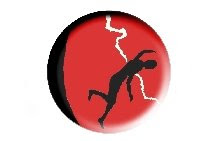.
The Old English word mare ('spirit'), from which the latter half of 'nightmare' is derived, eventually came to mean 'succubus'. The connection with the modern notion of a terrifying dream arises from the idea that the nightmare (or night hag, as she was sometimes called) was actually a succubus or an incubus (depending upon the sex of the dreamer) which sat on the breast of the sleeping person and induced such dreams. The etymology of the word has frequently been misunderstood, for the latter half has been taken to refer to the equine 'mare'. This has given rise to images of the nightmare as a demonic horse or horserider.”
.
Dictionary Of Demons, by Fred Gettings
Dictionary Of Demons, by Fred Gettings
.
.
Most of the dreams reported so far in this blog relating to severe physical illness have taking the form of nightmares; however, just because you have a nightmare obviously does not mean that you have a physical illness.
.
The average person has one or two nightmares a year. About five percent of the population have frequent nightmares. (Frequent and recurrent nighmares are also a sign of post-traumatic stress disorder.)
.
Again, as mentioned in an earlier blog, there is a Naitonal Nightmare Hotline, run by the folks of Cydreamwork:
.
1-866-376-7911
.






No comments:
Post a Comment